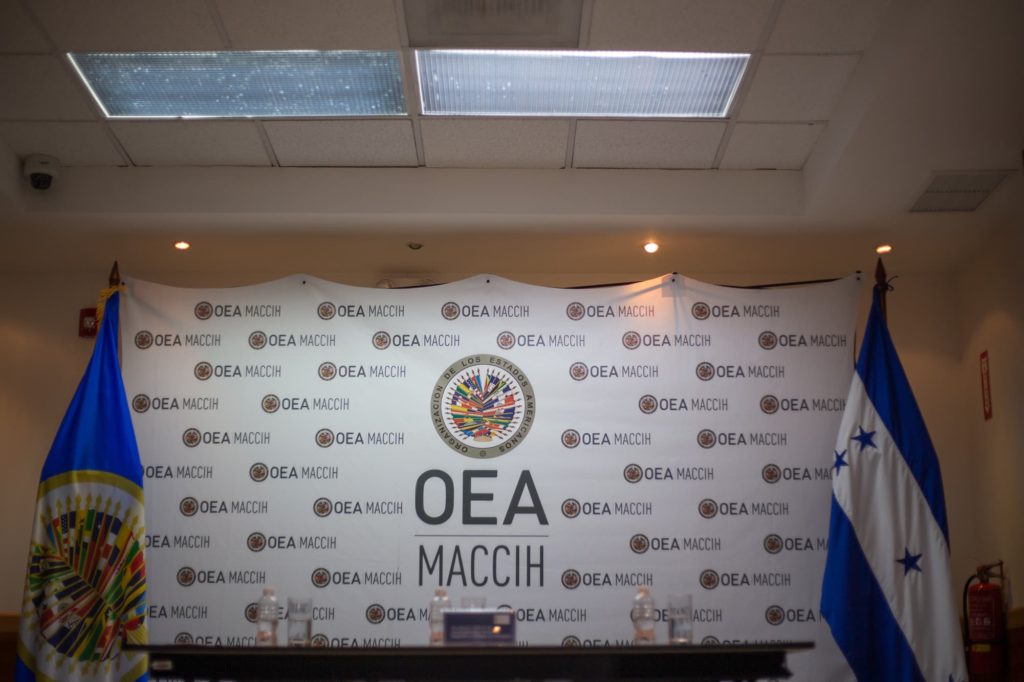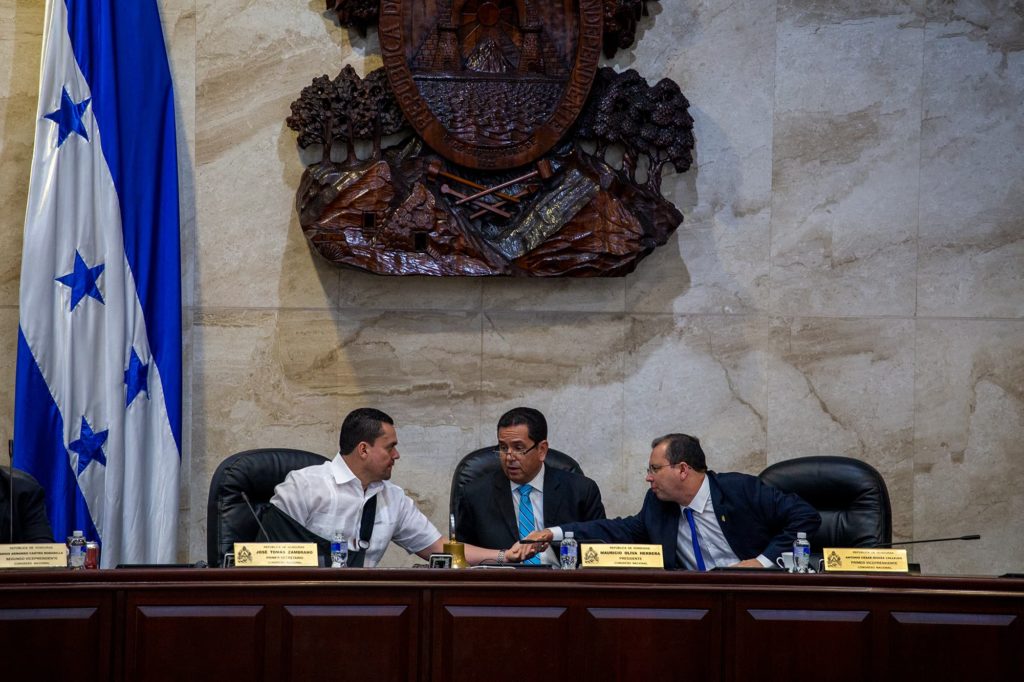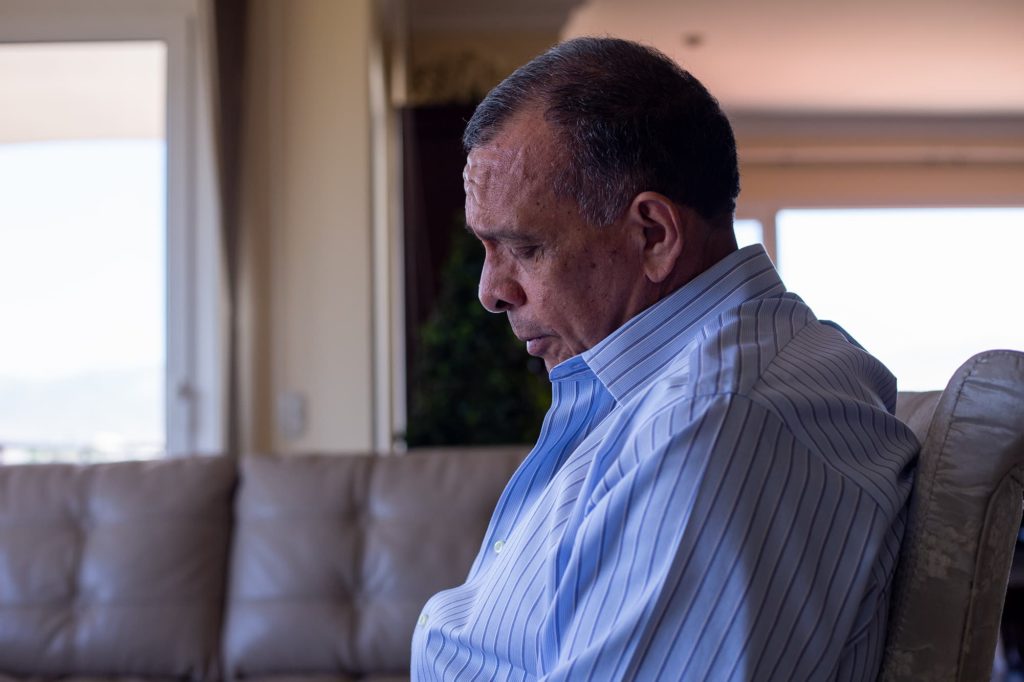A little over six months after the United States Congress passed the United States-Northern Triangle Enhanced Engagement Act (HR-2615), the U.S. State Department published a list of individuals identified as corrupt and undemocratic actors from El Salvador, Guatemala and Honduras. Individuals on this so-called Engel List will be subject to sanctions that include the cancellation or denial of a U.S. visa. Most of the Hondurans named on this list were also implicated in corruption cases brought by the defunct collaboration between the OAS Mission to Support the Fight against Corruption and Impunity in Honduras (Misión de Apoyo contra la Corrupción e Impunidad – MACCIH), and the Ministry of Justice’s special anti-corruption unit (Unidad Fiscal Especial Contra la Impunidad y Corrupción – UFECIC).
By Jennifer Avila
Photos by Martín Cálix
The U.S. State Department has declassified the so-called Engel List that identifies individuals in El Salvador, Guatemala and Honduras “determined to have knowingly engaged in actions that undermine democratic processes or institutions… and to have knowingly engaged in obstruction of investigations into such acts of corruption, including the following: corruption related to government contracts; bribery and extortion; the facilitation or transfer of the proceeds of corruption, including through money laundering; and acts of violence, harassment, or intimidation directed at governmental and nongovernmental corruption investigators.”
Of the 55 people on the Engel List, 21 are from Honduras, 14 are from El Salvador, and 20 are from Guatemala. The Hondurans include 18 current and former National Congress representatives, the official in charge of government procurement for the COVID-19 pandemic, and former president Porfirio Lobo Sosa (2010-2014) and his wife, Rosa Elena Bonilla. Most were directly charged or implicated in cases developed by MACCIH-UFECIC before it was dismantled by a National Congress led by Mauricio Oliva and President Juan Orlando Hernandez.
The Engel List also includes congressional representatives previously sanctioned by the United States under its Magnitsky Law, such as Oscar Nájera, a representative from Colon who is running for his sixth reelection, and other representatives like Welsy Vasquez, named in a U.S. State Department report requested by U.S. Representative Norma Torres in May 2021. Eight of the Honduran representatives identified in the Engel List are running for reelection to the National Congress this year.
For the full list, with short descriptions of each person, see here.
In a press conference announcing the release of the Engel List, U.S. Special Envoy for the Northern Triangle Ricardo Zuñiga, said “Combating corruption is a U.S. national security priority. As you know, President Biden and Vice President Harris are very focused on leveraging their experience – years of experience – in addressing the root causes of irregular migration from Central America … The United States stands with Central American citizens, organizations, and public servants who are committed to promoting the public good. We’re committed to generating opportunity and hope among the people of the region in the face of attacks on democratic institutions and setbacks on the rule of law and efforts to combat impunity.”
The release of the Engel List provoked a variety of reactions, including some who predictably minimized and ridiculed the sanctions. Contracorriente called every Honduran included in the list for comments, but none responded. However, many made statements on social media and press conferences, like former president Porfirio Lobo Sosa, who said he was offended and would never again travel to the United States. Similarly, congressperson Oscar Najera said his constituents would simply support him even more.
Former president Manuel Zelaya Rosales tweeted that while the Engel List confronted the Bukele administration in El Salvador, it seemed to encourage the Hernandez administration in Honduras. Bukele, in turn, posted “The Engel List didn’t include a single member of the Hernandez administration in Honduras, despite the fact that the president and several ministers have been accused, with evidence, of corruption and drug trafficking. And they’ve been in power for eight years. But of course, the political interests are different over there. The objective seems to be to build up the National Party for the November presidential elections.”
Due to the tense relationship between the United States and the Hernandez administration, the Biden administration seems to have decided that Guatemala is a more suitable strategic partner in Central America. No one from the Biden administration has visited Honduras to meet with Hernandez, who has been identified as a co-conspirator in drug trafficking cases being tried in the Southern District Court of New York, where his brother and former National Party congressperson, Antonio Hernandez, was recently convicted and sentenced to prison.
We asked Ricardo Zuñiga if the Honduran government’s obstruction of ongoing corruption cases and non-renewal of the MACCIH agreement had any consequences for the U.S.-Honduras relationship. Zuñiga replied, “Unfortunately, what we see is that the lack of accountability not only undermines the rule of law, but also diminishes the confidence that international markets, international partners, and most of all, the people of Honduras, have in the country. What we want to promote and support is the fulfillment of the commitment that the people accused of corruption have with their own constituents. That’s all. By demonstrating that public servants will be held accountable, we’re trying to foster more trust in their leaders and more hope for the people of Honduras.”
Former MACCIH spokesperson, Ana María Calderón, believes that this list carries a message of hope, especially for UFERCO – the Specialized Fiscal Unit Against Corruption Networks (Unidad Fiscal Especializada Contra Redes de Corrupción), the new but weaker anti-corruption unit created within the Ministry of Justice after MACCIH was not renewed.
In an interview with Contracorriente, Calderón said, “I would say that [the Engel List] is a message of hope for those fighting corruption in Honduras, especially for the Ministry of Justice and the UFERCO prosecutors who continue to pursue and prosecute the MACCIH investigations. It’s not easy since their operational capacity was greatly diminished after MACCIH disbanded. It also brings hope to regional anti-corruption initiatives undertaken by civil society organizations from El Salvador, Guatemala and Honduras.”
Calderón notes that the release of the Engel List also sends strong messages to those who prevented the Ministry of Justice and MACCIH from bringing corrupt public officials to justice. The Engel List includes congressional representatives Sara Medina and Roman Villeda who facilitated public corruption by changing the country’s budget law (Ley del Presupuesto) to reduce the scope and authority of the Ministry of Justice. These changes were institutionalized in the new Penal Code ratified by the National Congress.
Calderon said, “Some of these public officials have been able to get their individual cases, and the overarching cases initiated by MACCIH, dismissed or suspended. To quote U.S. Congressperson Norma Torres, ‘The world is watching them.’ This list shows that the outside world is watching them and impunity will disappear.”
However, the Engel List omits the president and secretary of the National Congress, Mauricio Oliva and Tomas Zambrano, respectively. Both were charged in the Impunity Pact case (also known as the Erratum case), which was later dismissed by the Supreme Court of Justice. This case charged Oliva and Zambrano with trying to change laws in order to restrict the investigative capability of the Ministry of Justice. Lastly, Calderon believes that the release of the Engel List is a clear message that the Biden administration will not partner with anyone who lacks a serious commitment to fighting corruption.
Most of the individuals charged in the 14 cases presented by MACCIH have had their cases dismissed. Calderon says that the Engel List is a tribute to the work undertaken by MACCIH. “The people on this list correspond to the UFECIC-MACCIH collaboration, which left a good legacy behind. At least six significant cases stand out, both criminal cases and deprivation of jurisdiction cases. For example, in the Congressional Network case, five of the eight people charged are on the Engel List: Hector Padilla Hernandez, Audelia Rodriguez, Augusto Domingo Cruz Asencio, Dennis Antonio Sanchez Fernandez, and Eleazar Alexander Juárez Sarabia. We know that a special law was enacted to get this case suspended. Unfortunately, things haven’t changed.”
The Impunity Pact case was initiated as a result of the legal maneuvering to spare certain members of the Congressional Network such as Sarah Ismela Medina Galo and Roman Villeda Aguilar, both of whom are on the Engel List. Of the 38 congressional representatives charged in the Pandora case, the Engel List names José Celin Discua Elvir, Rodolfo Irías Navas, Miguel Edgardo Martínez Pineda, Elvin Ernesto Santos Ordoñez, and Elden Vásquez.
Calderon said, “MACCIH’s Open Vault case revealed how government funds intended for public works were used instead to line the pockets of certain officials. The case was filed in the courts on December 11, 2018 and charged 21 defendants, six of whom appear on the Engel List: Juan Carlos Valenzuela Molina, Gladys Aurora Lopez Calderon, Gustavo Alberto Perez Cruz, Welsy Milena Vasquez Lopez, Milton Jesus Puertos Oseguera and Audelia Rodriguez Rodriguez. Another major figure on the Engel list is Rosa Elena Bonilla de Lobo, the ex-president’s wife, who was linked to the “First Lady’s Petty Cash” case. This case was the UFECIC-MACCIH team’s first successful prosecution and has had many strange twists and turns since then.”
Lastly, Calderon remarked that the Engel List names former president Porfirio Lobo Sosa, who was cited in MACCIH’s Narcopolitics case – a case currently being pursued by UFERCO. “This case came out of drug trafficker Devis Rivera Madariaga’s testimony that he financed [Lobo’s] political campaign in exchange for the ability to launder drug money through a company called Inrimar that obtained contracts for public works in the departments of Olancho and Tocoa.”
Besides the release of the Engel List, the U.S. government is undertaking other anti-corruption measures within the framework of HR-2615. These include a diagnosis of the root causes of migration and the effectiveness of actions to mitigate those causes. Section Three of HR-2615 requires the U.S. Secretary of State prioritize actions to promote inclusive economic growth and development in the region.
Read more: The US’s “Engel List” polishes the rough edges of the Northern Triangle
The United States also supports citizen initiatives such as the Center Against Corruption and Impunity in Northern Central America (Centro contra la Corrupción y la Impunidad en el norte de Centroamérica – CCINOC), and recently announced that the Department of Justice, with support from the Department of State, will create an anti-corruption task force that will include U.S. prosecutors and law enforcement experts to investigate and prosecute corruption cases with a nexus in the United States, Guatemala, and the region. This task force was announced by Vice President Kamala Harris during her June visit to Guatemala, where she told Central Americans that the U.S. borders were fortified and closed. “Do not come,” stressed Harris, just as every other U.S. administration has done.
While uncertainty reigns in Honduras during an election year in which most of the Hondurans on the Engel List are up for re-election, the relationship between the United States and Honduras is also unsettled. Hondurans are facing an economic crisis caused by the pandemic and two tropical storms that hit the country in late 2020. Meanwhile, the justice system is incapable of responding effectively to citizen complaints about the public corruption that continues to brutalize the rights of the vast majority of Hondurans living in desperate circumstances.
Calderon says that UFERCO needs to be strengthened with more prosecutors, and that the MACCIH-certified prosecutors should now carry on the good work it started. “Regarding the laws and regulations that curtail the scope and authority of the Ministry of Justice, let’s hope that legislators are truly committed and that they’ve taken this message to heart when they are performing their legislative function.”








